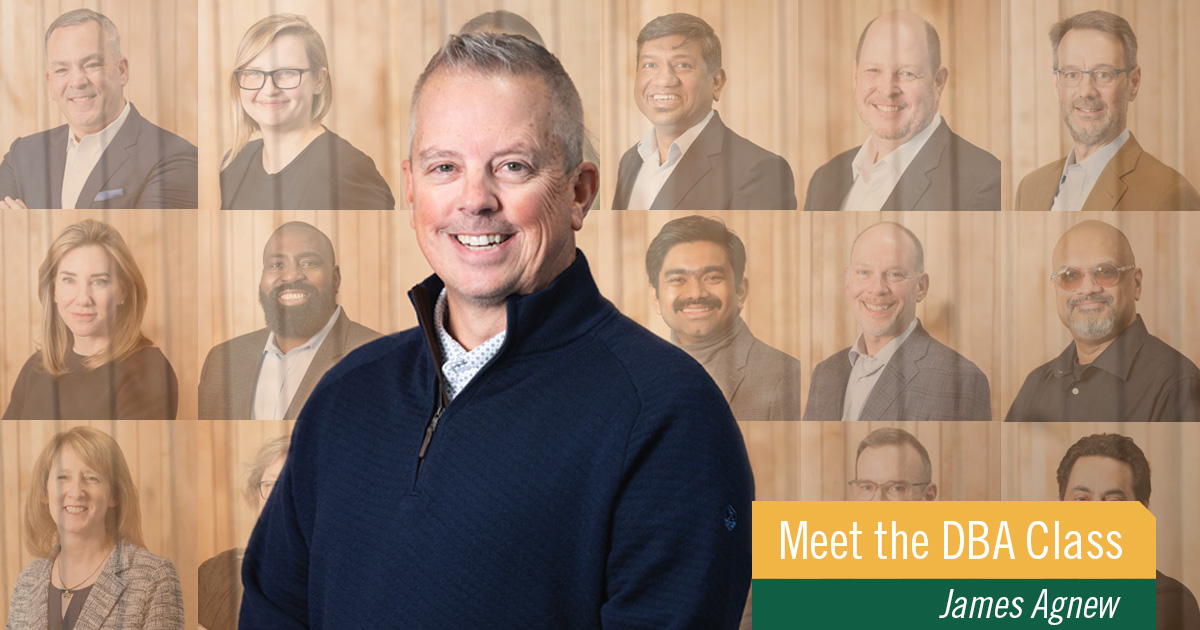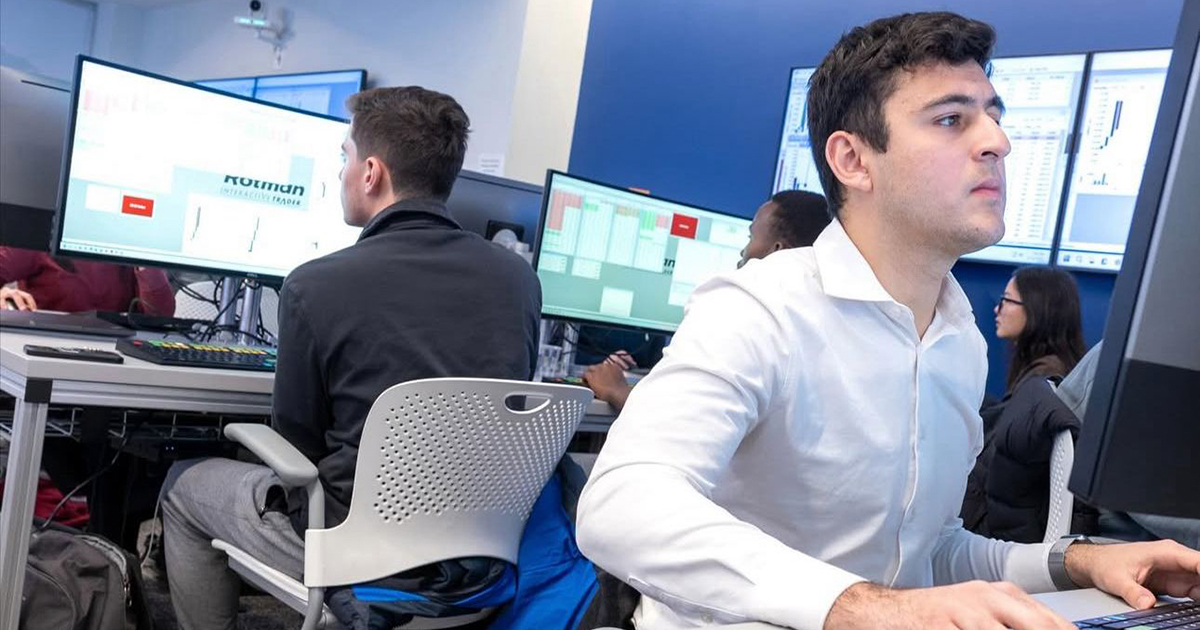Pursuing a Career in Sports
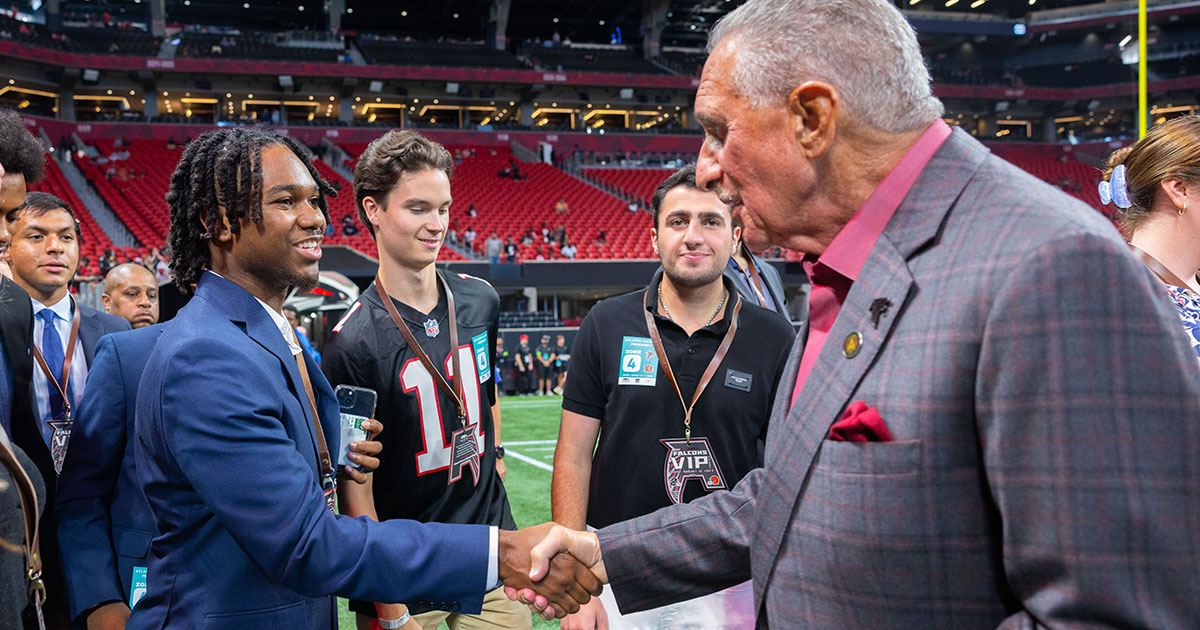
Like many people, Kody Harris ’25 grew up captivated by the world of sports, by its thrills and agonies, its great plays and star players.
He realized soon enough, however, that playing basketball or football at an elite level wasn’t going to happen for him, which was fine. Harris had other plans. “I have a passion for sports that transcends the playing field,” he says. “I knew I couldn’t play forever, but I wanted to keep sports in my life.”
Making sports a career isn’t easy. Landing a roster spot on a pro team may be a tall order, but competition for off-field roles can be intense as well. “A lot of people love sports, and there are only so many roles,” Harris says. “There is competition for every single aspect of it. It is tough to break in that door.”
Harris is striving to do just that. Last week, he started an internship with the Boston Celtics working on corporate partnerships. He also is the co-president of the Babson Sports Business Society, which aims to help its members make critical connections in the sports industry.
Additionally, he participated in the latest installment of Good Company, Good Game: Law, Ethics, and Leadership in Sports Business, a course inspired by the values and experiences of Arthur M. Blank ’63, H’98, as described in his book, Good Company. As part of the course, students took a weeklong trip to Atlanta to visit the Blank Family of Businesses, which includes the Atlanta Falcons football team and Atlanta United soccer team.
“It was a life-changing experience for me,” Harris says of the course. “I’m thinking bigger. I’m dreaming bigger.” At one memorable moment, he stood on the field of Mercedes-Benz Stadium, the home of the Falcons and United, and thought of the career in sports that’s waiting for him. “I want to be a part of this in some way,” he thought. “I can’t wait to get out and start my journey.”
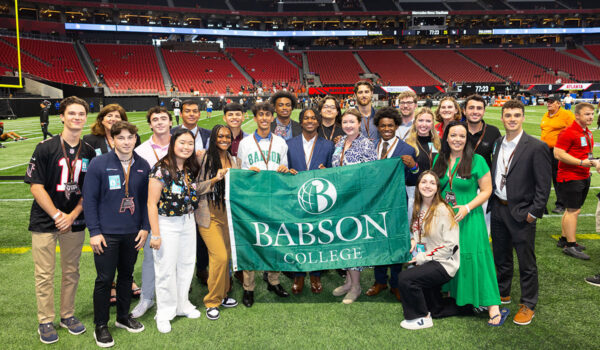
Professor Leslie Garbarino (far right, green dress) and her students in the Good Company, Good Game course pose for a group picture on the field of Atlanta’s Mercedes-Benz Stadium.
The Core Values
Harris first read Good Company last year and was immediately taken by it. The book outlines Blank’s six core values—Put People First, Listen and Respond, Include Everyone, Innovate Continuously, Lead by Example, and Give Back to Others—and how they inform his businesses. “He became a role model to me,” Harris says. “All of the things he has done, the legacy he has left behind, is something I aspire to do.”
Going to Atlanta, however, Harris admits that he was a little skeptical. Many companies publicly state their values and missions but don’t seem to live up to them. Would the Blank Family of Businesses be different?
Harris was happy to see that they are. The core values seem to permeate every aspect of Blank’s businesses, with employees from the executive suite to the retail floor trying to embody them. “I was really impressed,” Harris says. “His core values, he has truly lived by them. They are about treating people right and doing the right thing, even if no one is paying attention.”
“I was really impressed. His core values, he has truly lived by them. They are about treating people right and doing the right thing, even if no one is paying attention.”Kody Harris '25, speaking about Arthur M. Blank '63, H'98
After returning from Atlanta, Harris and the other students in the Good Company, Good Game course recorded videos that reflected on their experiences. Those videos were presented in class, and two leaders from the Blank Family of Businesses—Brett Jewkes, executive vice president, chief brand and communications officer, and Lara Fawaz, director, executive communications and brand integration—flew up from Atlanta to watch them.
In the videos, students talked about values and leadership and how they can follow the example set forth by Blank. “I want to thank you for inspiring me today, and for inspiring our leadership group,” Jewkes told the students. He also told them that the world needs values-based leaders who will think beyond the present to the impact they can make in the future. “You are going to change the world and have an outsized impact if you do it the right way,” he said.
Leslie Garbarino—who designed and taught the Good Company, Good Game course, with the support of The Arthur M. Blank School for Entrepreneurial Leadership—echoed Jewkes’ comments. “You have this unique experience. How will you take this out to the world?” asked Garbarino, an associate professor of practice in accounting and law. “I am really excited to see what you do.”
Future Plans
When Harris thinks about the future, the Houston resident is intrigued by the possibility of returning to Atlanta one day and joining the sports and entertainment side of the Blank Family of Businesses. Harris has family in the city, which has a vibrant sports culture and a supportive environment for African Americans like himself.
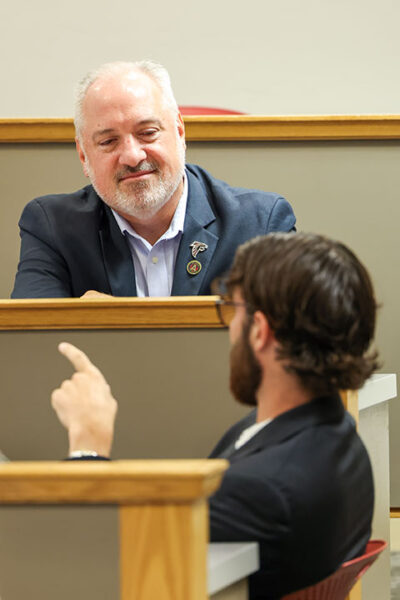
Brett Jewkes came to Babson’s campus and interacted with students in the Good Company, Good Game course. He is the executive vice president, chief brand and communications officer, for the Blank Family of Businesses.
Entrepreneurship also runs deep in his family, with relatives having started a wide variety of small businesses: a dance studio, cafe, law firm, video production company, IT consulting firm, and a nonprofit aiding foster children. Perhaps he’ll one day launch a business himself related to sports.
For now, he is focused on his Celtics internship, which he works 30 hours a week, and the Babson Sports Business Society, which plans to hold networking events, tours of local sports facilities and offices, and sports-specific career fairs.
Harris hopes to help expose the organization’s roughly 140 members to the sports industry and build up their professional networks. “If you manage your network the right way, you’ll find opportunities,” he says.
Whatever he does, he plans to carry Blank’s six core values with him. “These values serve as my North Star,” he says.

